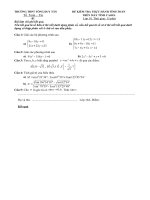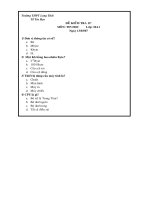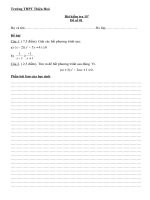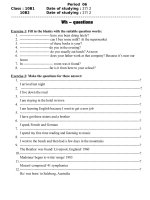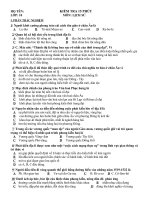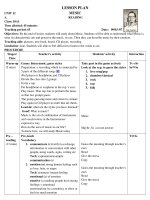grammar unit 15 lop 10
Bạn đang xem bản rút gọn của tài liệu. Xem và tải ngay bản đầy đủ của tài liệu tại đây (602.92 KB, 45 trang )
LANGUAGE
LANGUAGE
FOCUS
FOCUS
* Pronunciation:
* Pronunciation: /θ//đ/
* Grammar and
* Grammar and
vocabulary:
vocabulary:
1. Non-defining and
1. Non-defining and
defining relative clauses.
defining relative clauses.
2. Although to connect
2. Although to connect
contrasting ideas.
contrasting ideas.
I./Pronunciation:
•
Listen and repeat:
/θ/ /đ/
think thin they then
thought something those another
mouth birthday clothes brother
* Practise these sentences:
1.I thought Mr.Smith was thirty-three.
2. But next Thursday will be his
thirtieth birthday.
3. Something about him makes me
think he is like my brother.
4. The roses that you gave him are
beautiful.
5. Look at the clothes on that thin
man over there.!
II./Grammar and vocabulary:
A. Non-defining and defining relative clauses
1. Relative clauses : (Mệnh đề quan hệ)
* Remember:
_ Mệnh đề quan hệ là mệnh đề được dùng để bổ nghĩa
cho danh từ đứng trước nó.
_ Mệnh đề quan hệ phải đứng ngay sau danh từ mà nó
bổ nghĩa.
_ Trong mệnh đề thường có thể sử dụng những trạng
töø quan hệ: when, where, why, what.
_ Mệnh đề quan hệ được nối với mệnh đề chính bằng
các đại từ quan hệ: who, whom, which, whose, that…
Ex: 1. This is my country where I was born.
2. The boy who sits near me is very friendly.
WHO:dùng thay thế cho danh từ chỉ người;có thể
làm chủ từ hoặc túc từ.
a.This is the man who saved my life
(who=subject)
b.This is the man who\whom I was telling you
about (who\whom=object)
WHICH:dùng thay thế danh từ chỉ vật;có thể làm
chủ từ hoặc túc từ.
a.He took me to a restaurant which had very
good service (which=subject)
b.He took me to the restaurant which we’d read
about in the paper. (which=object)
THAT:có thể dùng ở các vò trí của WHO
hoacë WHICH như trong các câu trên.
a.This is the man that\who taught me how
to play the guitar.
b.He took me to the school that\which was
built his grandfather.
WHOSE: là đại từ quan hệ sở hữu thay thế
cho danh từ chỉ người hoặc vật,loài vật
(với ý nghóa như”his,her,their”….).
This is the man whose daughter teaches at
our school
(This is the man. His daughter teaches at our
school)
The man whose car was stolen is now
reporting to the police.
(The man is now reporting to the police. His
car was stolen.)
ZERO relative:khi who hoặ which dùng ở vò
trí túc từ(object) chúng ta có thể lược bỏ.
a.Do you remember the name of the man
who\whom we met on the train?
OR: Do you remember the name of the
man we met on the train? (zero relative)
b. The movie which we watched on TV last
night was really moving
OR: The movie we watched on TV last
night was really moving (Zero relative)
WHERE & WHEN : chúng ta có thể dùng
WHERE và WHEN như các đại từ quan hệ (Relative
pronouns). WHERE dùng sau từ chỉ nơi chốn;
WHEN dùng sau từ chỉ thời gian.
a). The factory is going to close down. My brother
works there.
The factory where my brother works is going to
close down.
b). We’re returning to the town. We spent a few
holidays in that town.
We’re returning to the town where we spent a few
holidays.
c). Do you remember the time? The accident
happened at that time.
Do you remember the time when the
accident happened?
d). I went on a trip last summer. I met my
boyfriend at that time.
I went on a trip last summer when I met my
boyfriend.
WHY : sau từ “ reason” chúng ta thường dùng
WHY ( cũng có thể dùng THAT để nối thành
mệnh đề quan hệ ( Relative claues) :
a). She left without saying anything. I don’t know
the reason.
I don’t know the reason why she left without
saying anything.
b). They were late. Did they tell you the reason?
Did they tell you the reason why they were
late ?
a. Defining relative clauses: (Mệnh đề quan hệ
xác định)
* Định nghĩa:
Mệnh đề quan hệ được gọi là xác định khi nó cần
thiết cho ý nghĩa của câu. Bỏ nó đi câu sẽ không
đầy đủ ý nghĩa. (Mô tả những danh từ đứng trước
nó để phân biệt với các danh từ khác cùng loại,
làm rõ danh từ).
Ex: 1. The woman who lives next door is a
doctor.
2. The hotel where we stayed was very clean.
b. Non-defining relative clauses: (Mệnh đề quan hệ không
xác định)
* Định nghĩa:
Mệnh đề quan hệ được gọi là không xác định khi nó không
cần thiết cho ý nghĩa của câu, bỏ nó đi mệnh đề chính vẫn
đảm bảo đầy đủ ý nghĩa.
* Đặc điểm:
Mệnh đề quan hệ được gọi là không xác định khi trước nó
là 1 danh từ riêng, hoặc trước danh từ đó có các tính từ sở
hữu (my, his, her, your, our, their,…) hay đại từ chỉ định
(this , that, these, those…)
Ex: 1. The Thames, which flows through London, is a
beautiful river.
2. His daughter, who sat next to me, sang well.
* Note:
_ Giữa mệnh đề chính và mệnh đề quan hệ
không xác định có dấu phẩy ngăn cách.
_ Không được lược bỏ đại từ quan hệ trong
mệnh đề quan hệ không xác định.
which: có thể thay thế cho 1 mệnh đề
Ex: Marry passed her driving test, which
surprised everybody.
c. Relative pronouns with prepositions: (giới
từ trong mệnh đề quan hệ)
_Giới từ thường đứng trước whom (cho
người) và which (cho vật).
Ex: to whom/with whom/for which/to
which/all of/ most of/ ….. + whom/which.
Mr.Smith, to whom I spoke on the phone
last night, is very interested in soccer.
B. Connecting contrasting ideas: Although
_ Chúng ta dùng các liên từ trong mệnh đề chỉ sự
nhượng bộ khi chúng ta muốn nói rằng có sự
tương phản xảy ra trong mệnh đề chính và mệnh
đề chỉ sự nhượng bộ.
_ Cấu trúc:
Although + S + V , main clause
Main clause + although + S +V
Cấu trúc trên cũng áp dụng đối với các liên
từ khác trong mệnh đề nhượng bộ, như: though,
even though.
* Note: Nếu các liên từ although, though, even
though được đặt ở đầu câu thì mệnh đề chỉ sự
nhượng bộ phải được đặt ngăn cách với mệnh
đề chính bằng 1 dấu phẩy. Khi chúng được đặt
giữa câu thì giữa 2 mệnh đề không cần dấu
phẩy ngăn cách.
Ex: 1. Although the home team lost, they
played very well.
2. Even though it was raining, I still went
to school on time.
3. He still goes to school although he isn’t
fine.
